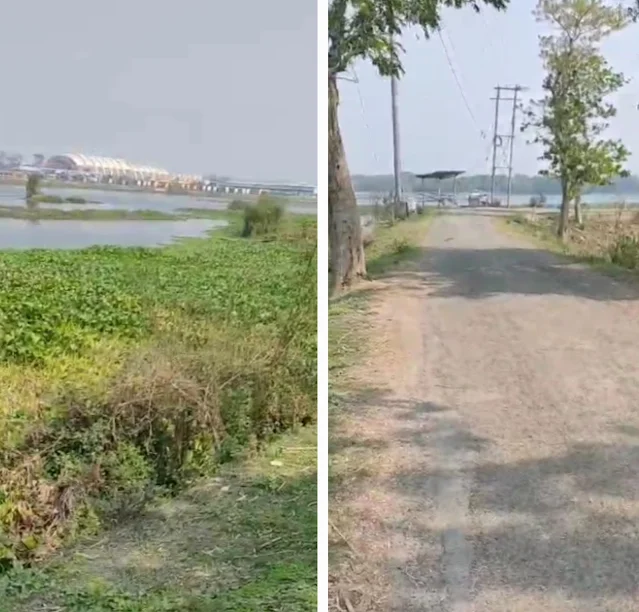A recent fact-finding report by Banglar Manabadhikar Suraksha Mancha (MASUM) has shed light on the dire conditions faced by residents of Teroghariya and Doghariya, two Indian villages near the Indo-Bangladesh border in West Bengal. The report, submitted to the National Human Rights Commission (NHRC), highlights severe human rights violations, socio-economic hardships, and systemic neglect caused by the mispositioning of the Border Security Force (BSF) naka checking post.
Situated at the edge of Indian territory, these villages are legally part of India but remain practically cut off due to a BSF post stationed 700 meters away from the actual border. This misplacement has led to restricted access to essential services, forcing residents to depend on Bangladesh for healthcare, daily necessities, and even trade. The situation has also fueled smuggling activities, with reports of illegal trade involving Phensedyl syrup, marijuana, and gold exchanges.
Fishermen and farmers face continuous harassment by BSF personnel, hindering their ability to earn a livelihood. The villagers, primarily from the Scheduled Caste Rajbanshi community, struggle to move freely within their own country, a direct violation of their constitutional rights under Article 21 (Right to Life and Personal Liberty) and Article 19(1)(d) (Right to Move Freely Within India).
One of the most alarming aspects of the report is the impact on children. The BSF has allegedly constructed unauthorized gates at the checking post, which are opened only at irregular intervals, often leaving children unable to attend school or return home from tuition. In some cases, children have been subjected to excessive checking, violating the Juvenile Justice (Care and Protection of Children) Act, 2015.
The MASUM report highlights several legal violations arising from the BSF's failure to properly guard the international border. The Border Security Force Act, 1968 mandates the BSF to protect and secure the international border, but their misplacement has instead compromised national security and facilitated illegal trade. The Scheduled Castes and Scheduled Tribes (Prevention of Atrocities) Act, 1989, prohibits discrimination against marginalized communities, yet the restrictions on movement and occupation of Scheduled Caste villagers amount to a violation of their fundamental rights. The Bharatiya Nagarik Suraksha Sanhita (BNS), 2023, under Sections 198 and 126, addresses disobedience of lawful duty and wrongful restraint, which could apply to BSF personnel restricting the villagers' movement. The Universal Declaration of Human Rights (UDHR), 1948, to which India is a signatory, guarantees freedom of movement and access to a basic standard of living, both of which are being denied to these villagers.
In light of the severe humanitarian crisis, MASUM has urged the government to take urgent action, including relocating the BSF naka checking post to the Zero Point at the international border to restore villagers' access to Indian territory. The organization has also called for legal acquisition and compensation if BSF requires land near the villages, lifting restrictions on fishing and movement through the naka post to allow villagers to sustain their livelihoods, implementing recommendations from the 2017 Parliamentary Standing Committee Report on Border Security to improve infrastructure and security management, and holding BSF officers accountable for negligence and human rights violations.
Kirity Roy, Secretary of MASUM, emphasized that the current situation is not just a border security issue but a humanitarian crisis that demands immediate intervention. "These Indian citizens have been left abandoned, their basic rights trampled upon by a system that fails to recognize their struggles. The government must act now to rectify this injustice and uphold the Constitution," he stated.
As the NHRC reviews the complaint, human rights organizations and civil society groups are calling for swift action to ensure that Teroghariya and Doghariya villagers can reclaim their right to a dignified life within their own country.


Comments